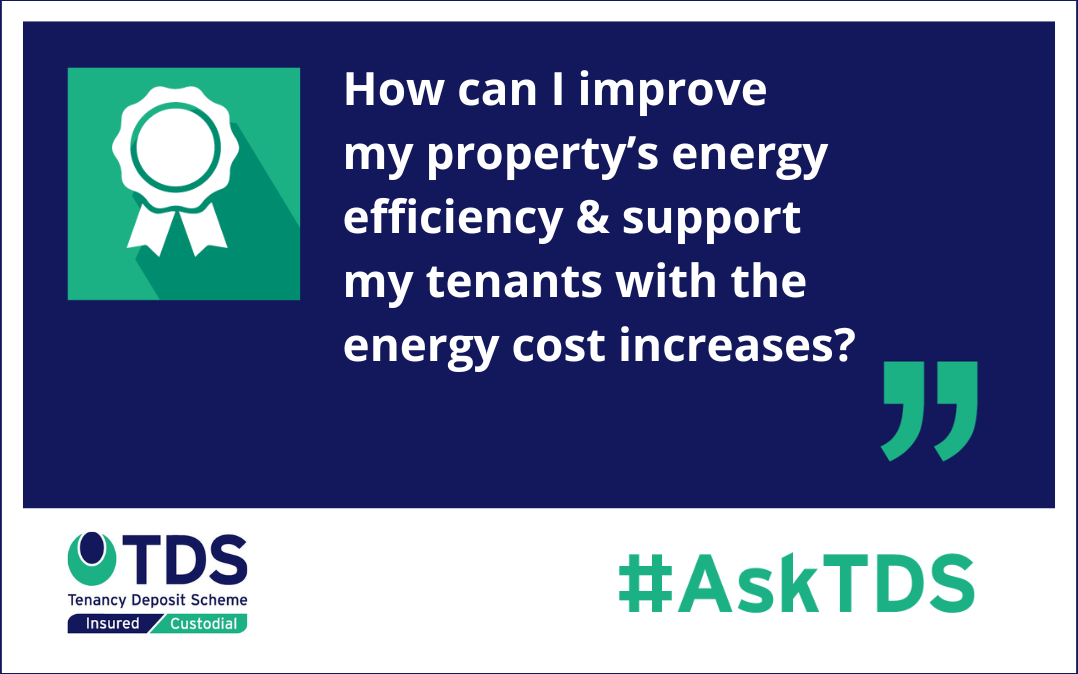From 1 October 2022, a typical household will pay a maximum of £2500 a year for gas and electricity for 2 years, as directed by the government. This applies to all types of energy tariffs. However, despite the cap, many are still facing a large increase in their energy bills. The Tenancy Deposit Scheme (TDS) was asked how to help improve our homes energy efficiency and help with the rising costs.
How energy efficient is your home?
Before implementing home improvements, it’s important to determine how much energy is used in your home and how much it’s costing. Having an Energy Performance Certificate (EPC) is not only a legal requirement when renting a property, but will also help you identify potential opportunities to improve your homes energy efficiency.
Unsure what your EPC rating is?
Take a look here, and keep in mind the government’s proposal for new EPC regulations, meaning that from 2025, your rented property would need to have a certification rating of C or above in order to let out legally. EPC’s are valid for 10 years and may need updating if you have made changes to your home since the assessment. Once you know where you stand, there are a number of simple steps that landlords can take to make their properties more energy-efficient and help tenants to reduce their bills.
Simple tips to improve your EPC, lower energy costs and reduce your carbon footprint
- Move to a Smart meter: If your home has not been upgraded to a smart meter, take this as an action to book one in. It will mean more accurate costs for your tenants and remove the costs of meter readings, which are currently added to bills.
- Draft-proof: Aside from windows and doors, DIY draught-proofing can also be done around letterboxes and keyholes. Draft-proofing kits are available online and at your local hardware shops.
- Change to LED lighting: Switching old light bulbs for low-energy LEDs uses approximately 90% less energy and can last up to fifteen times as long. Don’t forget the lighting in ovens and extractor hoods.
- Think about fabrics: For curtains, carpets and rugs, the thicker the better to help reduce heat loss from windows and floors.
- Check the radiators: Ensure the radiators are bled yearly so they’re working effectively, and consider fitting them with thermostat controls.
Renovating soon? Tips for long term energy efficiency.
- Upgrade your windows and doors: Think about double or triple glazing to improve heat retention.
- Insulate: One of the easiest and most cost-effective ways to improve a home’s energy efficiency is by fitting natural cavity or solid wall insulation. This is most needed for your ground floors, roof, loft, and external walls. Insulation around the hot water tank and pipes is also worth undertaking.
- Update your boiler: Save energy by upgrading your boiler, or consider installing a heat pump as a replacement.
- Buy efficient appliances: Double-check that the energy ratings are A+++ when purchasing new appliances.
- Solar panels: Install PV Panels on your roof with battery storage, and utilise the excess energy generated during the night.
Advice and support for tenants
Tenants have little control over their rental property energy efficiency, so any support you can offer will help keep your tenancy a happy one. Ofgem offers some advice on what to do should your tenants need help with energy bills here.
Are your tenants aware of the available government grants? Currently, these are:
The government will give every household £400 off their electricity bill. This is called the Energy Bills Support Scheme.
Winter Fuel Payment: A £100 to £300 fuel payment for people born on or before October 5 1954.
Cold Weather Payment: A £25 payment for every seven days of very cold weather between November and March.
Warm Home Discount: A £140 discount for some people getting Pension Credit or some people in low-income households.
Household Support Fund: A funding package to help vulnerable households this winter. The local council will be able to offer advice and help on accessing the fund.
The Citizens Advice bureau can provide further information on these schemes here.
The Tenancy Deposit Scheme (TDS) is one of The Letting Partnership’s trusted partners. For more details of who we work with see our Working in Partnership page
* * *


